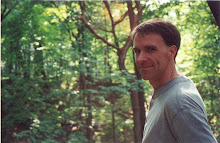[Street sign in New Haven] [Daumier's The Print Collector]
The highway extension barreling through town was called "The Connector," but it might as well be called "The Isolator." It was designed to whisk you directly to campus or its adjacent downtown. You never have to see the deteriorating neighborhoods that comprise much of New Haven. Signs point to New York, New Haven, and Hartford--the very name of the railroad line that ran past Hopper's Cape Cod house and that he used as the subject for a painting.
When I drove through town briefly the night before, New Haven's greens looked like African veldts on which existed only the hunted and the hunters. The walkway signs counted down how many seconds until the cars ran you over, and the locals assured me that they will run you over. To make visitors feel safer, the city now had "Hospitality Officers" decked out in lime green shirts and fedoras with mint-colored ribbons that made them look like demented St. Patrick's Day revelers. I noticed with irony that the Economic Growth Center was closed for construction during my visit.
I started sightseeing at my version of a safe zone: an independent coffee shop.  A bench out front where I had hoped to sit was already occupied by a grizzled character whose baby face had turned sour, aging him past his 30 years. He wore green jeans with rolled up cuffs, white sox, black shoes, a T-shirt, and a frayed sweater beneath an open coat. He hunched like a boxer ready to throw a punch, and each knuckle bore a tiny cross tattoo and figures that spelled out "SORT" and "13½."
A bench out front where I had hoped to sit was already occupied by a grizzled character whose baby face had turned sour, aging him past his 30 years. He wore green jeans with rolled up cuffs, white sox, black shoes, a T-shirt, and a frayed sweater beneath an open coat. He hunched like a boxer ready to throw a punch, and each knuckle bore a tiny cross tattoo and figures that spelled out "SORT" and "13½."
I asked him about New Haven and isolation.
He paused, then growled, "If you step outside the downtown area, it's a ghetto. Why do you want to know this anyway?"
"I'm studying New Haven and some other towns," I explained.
"Why New Haven?" he hounded me.
"There are paintings by Edward Hopper in the museum here."
Suddenly, he perked up. "Oh, he's one of my favorites. His paintings here are really great. You're gonna like them. I go to that museum about a dozen times a year. You know about the British Art Museum here too, right? I go there all the time, too. You'll enjoy those museums. Those Hoppers are really beautiful."
"Do you think people here are as isolated as they're portrayed in Hopper's paintings?"
He squinted and dragged on his cigarette. "Yeah. It's a real town-and-gown place. The real division here is between the haves and have-nots. I'll tell you what kind of a town it is. The Yale University food workers thought they'd be out of a job at Yale if students were given vouchers good at local restaurants, so they picketed the restaurants and put the workers there out of jobs." He looked to one side. "That's when I lost my job." He grew quiet and sucked hard on his cigarette.
I thought it best to move on.
Except for that, he was a younger version of me or Joe or Joe's friends. In a society that worships youth and camaraderie and mocks aging and isolation, I admired such single aging men fighting for dignity. I was well on my way to becoming one myself.
I made a note to be sure to send Joe a thank-you note.
20081125
72 New Haven: Town
Subscribe to:
Post Comments (Atom)




No comments:
Post a Comment